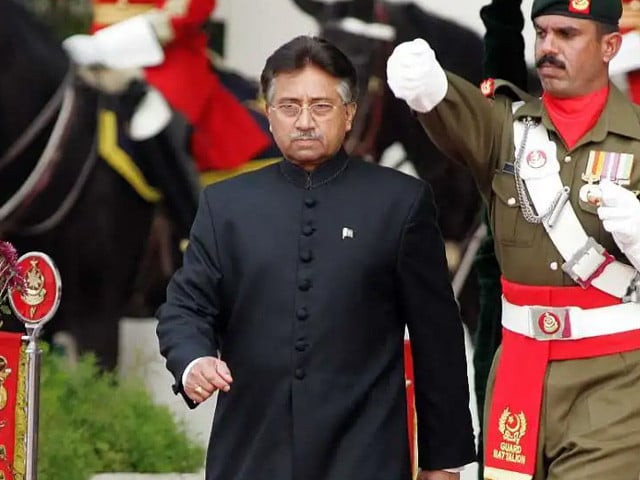February 5, 2023 marks the demise of former president General (retd) Pervez Musharraf. He was the fourth military dictator to abrogate the Constitution and establish legitimate rule over Pakistan. Although the martial law remains the biggest sin committed by Musharraf, his tenure as the president was not all that bad, compared to his predecessors and successors. There have been failures and achievements; drawbacks and advantages. All in all, people’s feelings towards Musharraf have been bittersweet as was his rule.
As chief executive, Musharraf had undertaken various initiatives for the revival of economy, empowerment of women, devolution of power, representation of minorities, and press freedom. His economic policies revolved around liberalisation, deregulation and privatisation. The GDP growth of Pakistan was 3.9 per cent in 1999-2000, which rose to 6 per cent per year from 2000-2007 under Musharraf’s rule. The revenue collections increased from Rs308 billion in 1999 to Rs846 billion during 2007, whereas the Foreign Direct Investment (FDI) increased from US$ 4.87 billion to US$ 13.195 billion. The foreign debt decreased from $38.5 billion to $34 billion.
Pertaining to women empowerment, the steps undertaken by Musharraf have been tremendous. He endorsed the rights of women and empowered them in all walks of life. To increase women’s political representation, Musharraf had reintroduced the concept of reserved seats for women in the parliament, provincial assembly and the senate. Moreover, 33 per cent quota had been reserved for women in all three tiers of local government, under the Devolution Plan 2001.
To enhance the role of women as decision-makers, six women were included in the federal cabinet and 10 per cent quota was reserved for women in Central Superior Services. Besides, certain other measures to empower women socially include the Criminal Law (Amendment) Act, 2004, which was passed to ensure effective persecution of cases of honour killings; and the Protection of Women Act, 2006 which was put into place to amend the highly criticised Hudood Ordinance laws of 1979 and preserve justice and security for women. The female literacy rate during Musharraf’s era grew from 32 per cent in 1999 to 42 per cent in 2007.
To ensure genuine local democracy, Musharraf had put forth the Devolution of Power Plan in 2001, in order to transfer the administration and finances to the local governments. Moreover, a private news channel revolution was witnessed during Musharraf’s tenure, who had created the operating space for the airing of private news channels. To increase the political representation of minorities, Musharraf reintroduced the joint electorate system to increase the political representation and influence of minorities.
At a regional level, the most important milestone achieved by Musharraf was the revival of the Confidence Building Measures (CBM) between India and Pakistan, marked by the composite dialogues in 2004-2005 between Musharraf and Atal Bihari Vajpayee. The Four Point Formula put forth by Musharraf during the dialogues to resolve the long-standing Kashmir conflict have been very significant as it was acceptable to all three parties, India, Pakistan, and especially the Kashmiris. The CBMs, however, were soon disrupted, but the formula presented by Musharraf still remains a viable option to be considered in order to resolve the dispute.
Despite what his rule has achieved, nothing can serve as a justification or a compensation for the illegitimate rule of Musharraf. The violation of the Constitution, at the hands of military dictators, time and again, has cost Pakistan a lot. Furthermore, Musharraf was a key ally of the US in the war on terror which resulted in the rise of terrorism across Pakistan. Whether it was Musharraf’s choice or an imposition of the “with us or against us” agenda is still debatable. However, the double game played by Musharraf by fighting militants on one hand and supporting the Taliban on the other was a vice, the impact of which continues to damage Pakistan, internally and externally.
The rise of Tehreek-e-Taliban Pakistan (TTP) in 2007, their growing foothold in the tribal areas and the subsequent loss of lives, the declining economy and infrastructure resulting from terrorism across the country, is a by-product of Musharraf’s double game. The downfall of Musharraf came soon after he imposed the state of emergency, thus suspending the Constitution of Pakistan. Musharraf’s Provisional Constitutional Order (PCO) and the state of emergency, both were declared unconstitutional and illegal by the Supreme Court.
However, taking everything into account, people’s love-hate relationship with Musharraf reflects the merits and demerits of his rule. Musharraf was neither the best chief executive nor the worst military dictator. Keeping the biases aside, Musharraf needs to be criticised and appreciated for what he was and what he did. To conclude, for all the good and bad reasons, the former president will be remembered for a very long time.
May he rest in peace.



COMMENTS
Comments are moderated and generally will be posted if they are on-topic and not abusive.
For more information, please see our Comments FAQ